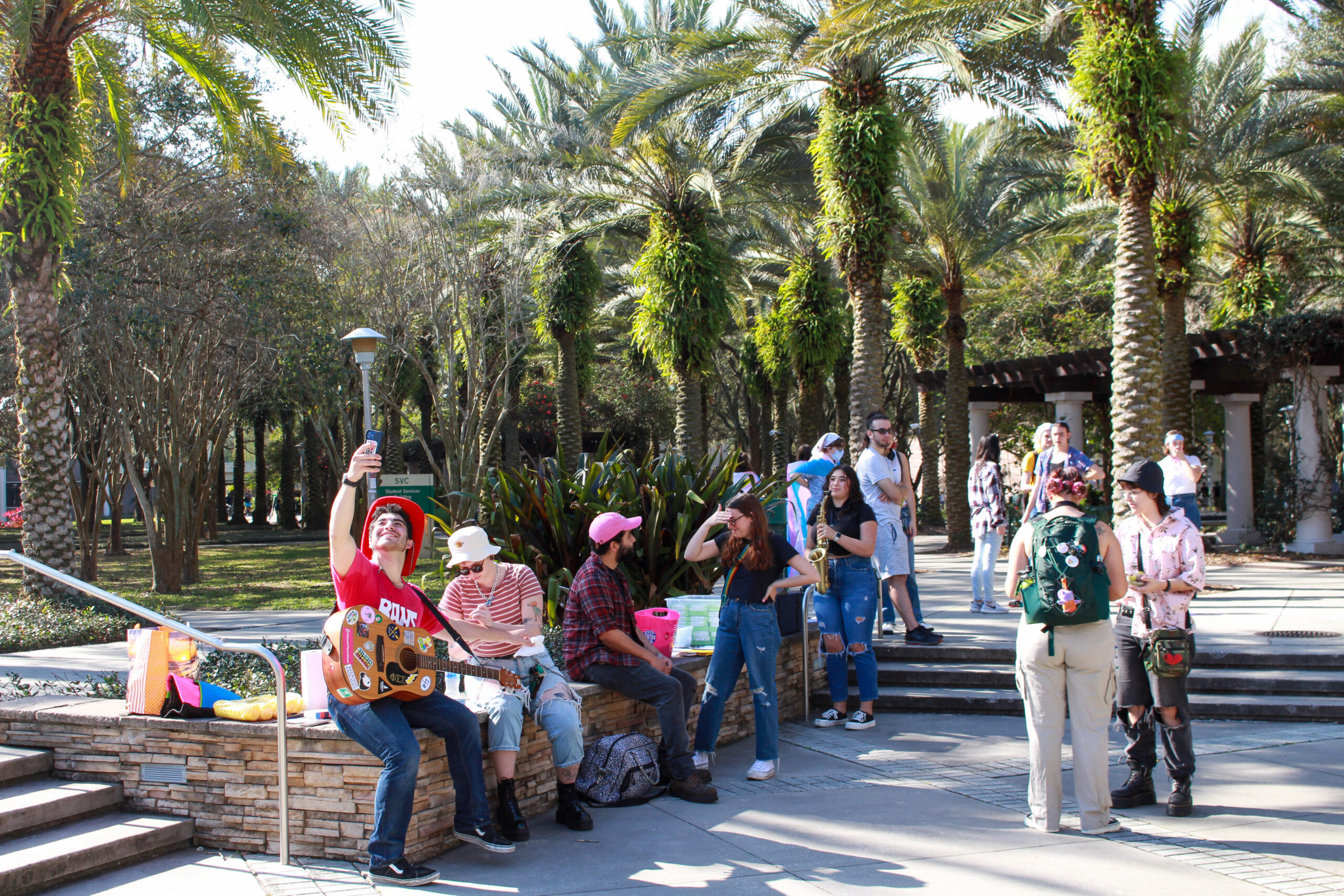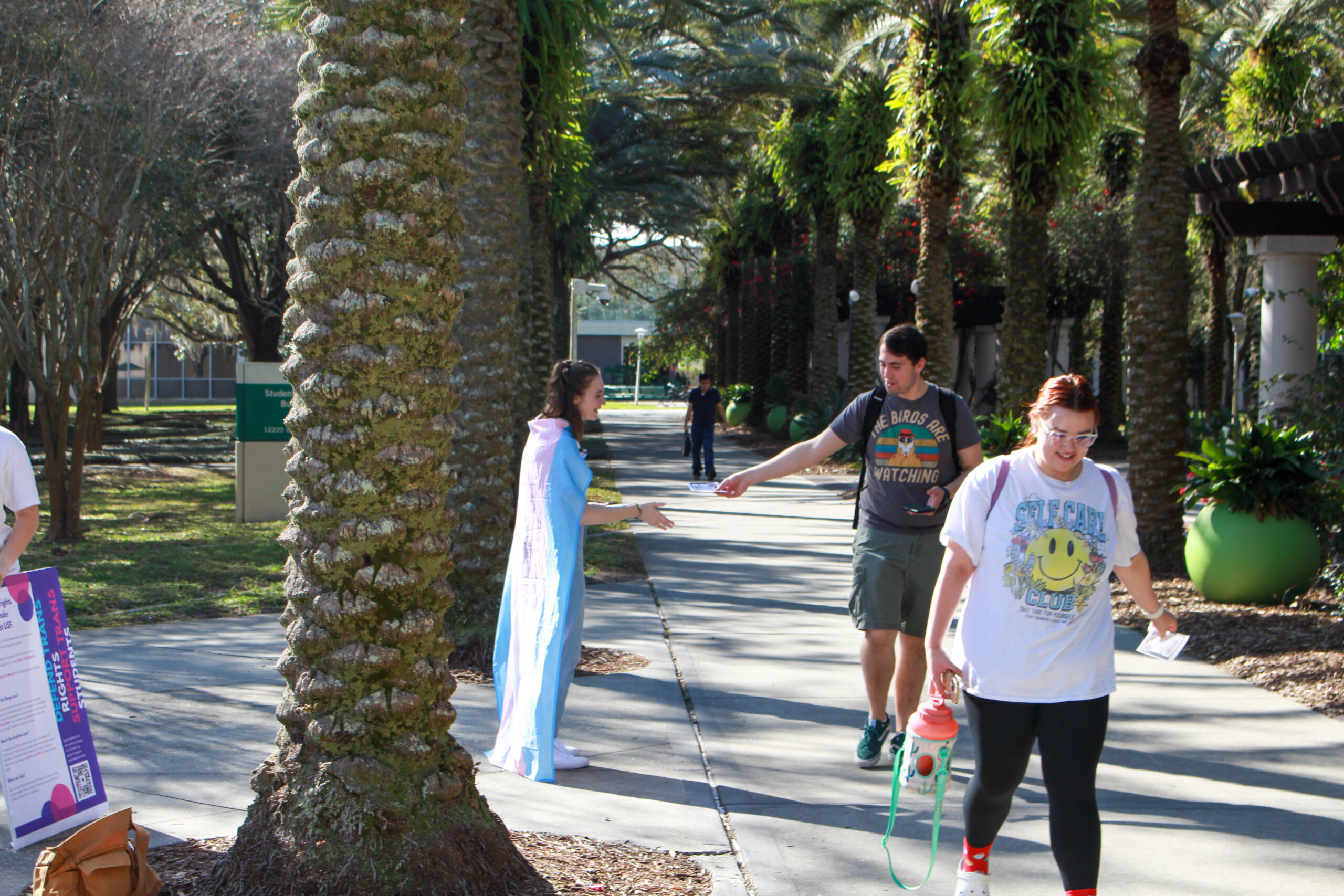Transgender rights demonstration held in response to DeSantis’ gender-affirming care investigation

Following an announcement made by Gov. Ron DeSantis to investigate gender-affirming care procedures performed by Florida public universities, freshman communications and music studies double major Brooke Starz felt compelled to take a stand.
Starz was one of 12 students handing out flyers linked to a petition for USF leadership to protect transgender students’ rights to medical privacy at the protest, which occurred Tuesday in front of the Marshall Student Center (MSC).
In contrast to other demonstrators in the group, their face was painted pink, blue and white in honor of the transgender flag. Fighting for protections against USF’s transgender community in the face of DeSantis’ investigation marked not only a sign of protest, but a symbol of their identity, according to Starz.
“Protecting LGBTQ+ rights helps us seem more like people. People look at us differently or they look at us as trans people, so just having resources and having awareness is just making us more normal,” they said.
“There’s nothing wrong with being unique, but wanting to just be able to live happily, and looking however you want and asking you how you want … that’s so important for existing. I mean, what’s the point in life if you can’t be yourself and be happy in who you are and what you’re doing?”
Leading the protest was a leadership team created among junior economics and philosophy major Ben Braver and representatives of the Trans+ Student Union. Despite three other protests occurring on campus, Braver said he found celebrating trans joy to be especially important given recent attacks on LGBTQ+ rights by the Florida legislature.
The protestors’ petition, which is also available online, addresses USF President Rhea Law, students, staff and faculty and urges them to take action in protecting the privacy of transgender students.
DeSantis’ request, released Jan. 11, requires all Florida public universities to submit detailed information on services they provide to people seeking gender affirming treatment. Services required to be disclosed include the number of encounters when sexual reassignment procedures were sought out as well as the names of the facilities patients were referred to, according to a Jan. 22 Oracle article.
Protestors stood outside of the MSC collecting signatures between 9 a.m. and 5 p.m. to present to USF Health in response to DeSantis’ investigation, which requires USF to disclose procedures performed on each of its campuses.
Those passing by the demonstration were greeted with popular songs sung and played on the guitar by the protestors as well as chants of “Do you believe in civil rights?” and “Protect trans rights now, sign the petition.”
Students who stopped to engage with demonstrators and sign the petition were greeted with a variety of activities and free items to grab, including cornhole, face painting, condoms and Tampa Bay Abortion Fund stickers.

Given the authority granted to the government by Florida Sunshine Law — which grants anyone the ability to request state held documents, data or information — the group wrote in their petition that transgender students can be personally identified by both the government and malicious actors if the investigation is conducted as ordered.
For a member of the Trans+ Student Union who wished to remain anonymous, DeSantis’ utilization of the Sunshine Law represents a blatant and intentional attack upon transgender communities across the state of Florida.
As students involved in the investigation cannot claim that their HIPPA rights are being violated given how Sunshine law is structured, USF’s anonymous medical data on transgender students can easily be used against them, according to the anonymous source.
“We stand against DeSantis’ request to USF Health to provide anonymized data on transgender healthcare, which is to say the services provided to how many students and the ages of those students. While these are not medical records … it is getting into dangerous territory with the right to privacy because with age and only a few other things, it can get very easy to extrapolate who is receiving that health care and support,” they said.
“So we’re here to demonstrate against that and to prove to both USF and DeSantis that the student body of USF will care about its trans students and that we’re not going down without being vocal about our basic rights.”
Ensuring private medical records aren’t disclosed shouldn’t just be a priority for transgender students, but the American public, according to Starz. If the government has the ability to require individual healthcare records to be disclosed, they said they fear little will prevent DeSantis from extending his authority to researching other vulnerable groups.
Following the demonstration, Braver said he and representatives of the Trans+ Student Union met with Student Government (SG) to discuss USF’s plan of action in responding to DeSantis’ investigation.
In addition to presenting the book of signatures, which ended up gathering over 700 signatures during the demonstration, Braver said he was also able to speak to SG representatives about drafting a resolution for the university to denounce the investigation. If the resolution were to gain support, Braver said his hope is that all Florida public colleges would be able to back the statement collectively.
Proceeding into the future, Starz said politicians must realize the ramifications decisions such as DeSantis’ gender affirming care investigation have upon transgender communities. Without means to protect themselves from having their private medical information disclosed, Starz said transgender students will be left more vulnerable than ever before.
“This could result in people getting outed to their family, people coming into the school attacking people or people just not being able to get the things that they need in order to transition. I know a lot of people that get help here that they couldn’t get at home because they couldn’t tell their parents,” they said.
“They didn’t have states that were able to help them out, so we’re really lucky to have this resource here and to have that taken away or to have us be attacked because we have a resource is horrible.”








